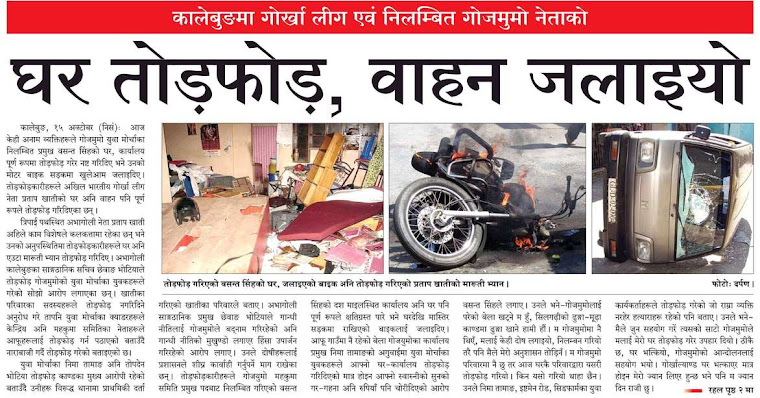NEW DELHI: Ahead of the second round of tripartite meeting with Gorkha leaders and the West Bengal government here on December 29, the Centre has finalised the modalities which will revolve around giving more powers to the Darjeeling Hills through special status instead of acceeding to the separate state demand.
The Gorkhas will be represented by the GJM which has been on the warpath since February demanding creation of a separate state — Gorkhaland — comprising the three hill sub-divisions of Darjeeling, Kurseong and Kalimpong, besides Siliguri sub-division in the plains and the adjacent area in North Bengal.
Though GJM has been insisting on statehood, officials in the home ministry hinted that the Centre would in no way agree to the demand which has not found favour with other sections like non-tribals living in the area.
Sources in the home ministry said the negotiators would keep in mind the unique geographical position of the area as this has implications considering the sensitivities of the people living there.
The region — a thin strip of land called Chicken’s Neck which separates China and Bangladesh and also connects India’s mainland with North-East — has always been on the radar of security agencies which have time and again resisted the separate statehood demand.
Referring to such concerns, the sources said the Centre would not agree to any decision by excluding the wishes of a majority of non-tribals in the region as it could create unrest, opening a new front for insurgents and `external elements’ to fish in troubled waters.
“Through the tripartite talks, the Centre would like to address all such concerns by taking into confidence all stake-holders and the state government,” said a senior officer.
The Gorkhas will be represented by the GJM which has been on the warpath since February demanding creation of a separate state — Gorkhaland — comprising the three hill sub-divisions of Darjeeling, Kurseong and Kalimpong, besides Siliguri sub-division in the plains and the adjacent area in North Bengal.
Though GJM has been insisting on statehood, officials in the home ministry hinted that the Centre would in no way agree to the demand which has not found favour with other sections like non-tribals living in the area.
Sources in the home ministry said the negotiators would keep in mind the unique geographical position of the area as this has implications considering the sensitivities of the people living there.
The region — a thin strip of land called Chicken’s Neck which separates China and Bangladesh and also connects India’s mainland with North-East — has always been on the radar of security agencies which have time and again resisted the separate statehood demand.
Referring to such concerns, the sources said the Centre would not agree to any decision by excluding the wishes of a majority of non-tribals in the region as it could create unrest, opening a new front for insurgents and `external elements’ to fish in troubled waters.
“Through the tripartite talks, the Centre would like to address all such concerns by taking into confidence all stake-holders and the state government,” said a senior officer.























1 comment:
Govt seeks 'structured' discussion on Gorkhaland issue
New Delhi (PTI): The Centre on Monday said specific issues related to governance should be analysed first before going ahead with the talks over the Gorkhaland issue.
The government's assertion came after the four-hour-long second round tripartite meeting attended by representatives of the Centre, the West Bengal government and the members of the Gorkha Janmukti Morcha (GJM), which is spearheading an agitation for a separate Gorkhaland carved out of West Bengal.
"Some information and details on aspects of governance were sought and these details provided by the GJM would now be analysed closely. We will be in mutual consultation over specific issues before the next round of meeting can be held in a more structured manner," Home Secretary Madhukar Gupta told reporters after the meeting.
Today's meeting was attended by a 17-member delegation of the GJM, Home secretary Madhukar Gupta, Intelligence Bureau Director P C Haldar, West Bengal Chief Secretary Amit Kiran Deb, Director General of Police Anup Bhushan Vora and Bengal Home secretary Ashok Mohan Chakraborty.
On the recent clashes between GJM supporters and police, Gupta said, "We have made requests to ensure that normal life does not get disrupted and asked the government of West Bengal to ensure that no confrontation between GJM groups and authorities takes place."
Gupta added that the aim of the meet is to "resolve the issue keeping in line with the national interest and considering the aspiration of the people."
Post a Comment